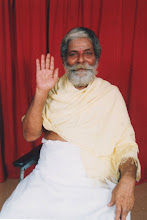"I do nothing at all, " thus would the harmonised knower of Truth think seeing, hearing, touching, smelling, eating, going, sleeping, breathing,
My understanding:
For him, who is self-realized his Self as the universal Self, whose mind and intellect are pure, who has control of his sense organs,who has peace within him, who has control on his desires, there will be no bondage of Karma even though he is involved. Who has control over inner world, he could not bound by his actions. While doing all his day today activities like sleeping, dreaming, talking, walking, eating, drinking.. etc he will be aware of his own Self. Every action of his will be divine. He thinks that he is not doing anything, while doing all his activities. He sees God in everything. He is divine being.
Commentary by Chinmayananda Swami:
In the previous verse, it was said in a sweeping generalisation, that he who pursues Karma Yoga along with meditation, will ere-long reach the State of Perfection in his own personal experience. Here, in this verse, Krishna is trying to give us the logic of the state of inward revolution that will take place when we make the pilgrimage to the Infinite in us, from our own present state of finitude and bondage.
With scientific thoroughness and logical precision, all the different stages of development and change that take place in an individual through Karma Yoga are enumerated here. He who is well-established in Karma Yoga, accomplishes purification of his intellect. Any purification in the subtle body, means a better state of quietude within. The lesser the agitations caused in us by our desires or emotions, the purer are we considered by Vedanta. Through action, when it is selfless and without anxiety for the fruits, the practitioner exhausts his existing vasanas. When the inner equipment is swept clean of its desire-waves, it must, necessarily, become more and more quiet and peaceful. When once the intellect is purified, meaning, rendered immune to desire-disturbances, the mind, which reflects the condition of the intellect, cannot have any disturbances. The sentimental and emotional life of one who has controlled the flood-gates of desires, automatically becomes tame and equanimous.
When, through Karma Yoga, a man has gained inward peace, both at his mental and at his intellectual levels, it becomes child's play for him to deny and to restrain, to control and to guide his sense organs and their never ending appetites. A seeker (Yogi), who has thus controlled his body, mind and intellect, is best fitted for the highest meditation. In fact, all obstacles in meditation are nothing other than the mile-stones of sensuous appetites, emotional agitations and desire-problems. Once these chains are snapped, he comes to the natural condition of deep meditation, wherein the re-discovery of the Self must be instantaneous and complete.
This realisation of the Self cannot be partial; it is not realisation, if the meditator understands only himself to be Divine. To the realised, Divinity or the Self is Infinite and All-pervading. From the innermost sanctum of the Spirit when he looks out, he realises nothing but Divinity-everywhere, in everyone, at all times. Therefore, the Lord says, such a person "realises his own Self as the Self in all beings."
When a wave has realised its true nature to be the ocean, in its true ocean-vision, there cannot ever be any other wave which is other than the ocean-essence.
When an individual, who has thus, through a total inner revolution, come to realise his essential Infinite Divinity, acts thereafter in his Atmic-consciousness, his actions cannot leave any reactions upon him. Reactions of actions can be claimed and arrogated only by the ego, and since, after God-realisation there is no sense of ego left in the God-man's bosom, his actions can thereafter leave no impression upon him. Like a signature upon running waters, nothing can ever stay in him to leave behind a vasana.
On the whole, the theory of Karma Yoga propounded by Krishna has been consistently kept up by the Lord in all his declarations; but often it is conceived beautifully in the suggestive fragrance of his words. In the stanza under discussion also, it has been amply brought out that ego-centric activities, motivated by desires, alone can create vasana-granulations upon the intellect, and consequently dim its discriminative awareness to know, to feel and to experience the Eternal Divinity, which is the essential nature of man as a spiritual being.
IN THIS CONSCIOUSNESS OF UNIVERSALITY AND SUPREME SENSE OF DIVINITY, WHEN A SAGE ACTS, WHAT EXACTLY WILL BE HIS ATTITUDE IN LIFE?
"I do nothing at all, " thus would the harmonized knower of Truth think seeing, hearing, touching, smelling, eating, going, sleeping, breathing.




No comments:
Post a Comment